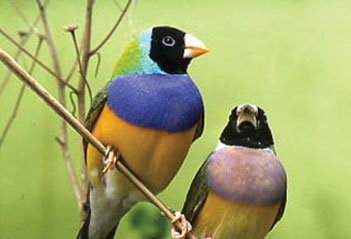Thank you for joining us on part two of this journey, looking at how Haith’s cater for finches (Domesticated Foreign, Zebra, Bengalese, Gouldian Finches), small Parrot-like and Budgerigars too. If you missed part one click here to view it on the internet.
This week, we’re looking at Bengalese Finches and Gouldian Finches:
Bengalese Finches:

The Bengalese Finch is a pure domesticated finch and does not occur in the wild. It is thought that it was developed in Japan during the late 18th century from a race of the White-rumped Munia; probably Lonchura striata acuticauda or Lonchura striata swinhoei which are found in India and China. Over 200 years of domestication have resulted in a charming little cagebird which is suitable as a pet and also as a cage and aviary bird. They can live for up to about 8 years so are a good proposition as pets.
Selective breeding and mutations have resulted in a broad range of colours and also in a crested form. Bengalese are the ultimate 'beginner's bird' but are also a great challenge for the more exhibition minded bird-keeper. They are often used as reliable and dedicated foster parents for other small finch species but it is always better to allow natural parents to rear their own young if at all possible.
Feeding Bengalese is simplicity itself, requiring little more than good basic millet / canary seed mix including a few other seeds for variety. In this case you cannot do better than offering Haith's Foreign Finch Mix with the addition of a little Haith's Prosecto Insectivorous mix. During breeding Haith's Rearing and Condition Food, Egg Biscuit Food or Nectarblend come into their own providing adults with essential nutrition at this stressful time. Foreign Finch Soakseed is also eagerly taken at this time, but don't overdo it, as the chicks may be fed on little else. As with other domesticated small finches, Haith's Millet Sprays can be an important addition to the diet as they also provide a welcome opportunity for the birds to forage and, when soaked, can be used as a rearing food for youngsters. Essential for the digestive process is Fine Oystershell Grit, and Granulated Charcoal can also be beneficial. Small Cuttlefish Bone will supply essential calcium and other minerals may be made available from Haith's Mineralised Tonic Grit.
Gouldian Finches:

Gouldian Finches originate from Australia and are perhaps the most brightly coloured of the small-domesticated exotic seed-eaters. They are widely kept in cage and aviary but are more sensitive to changes in environmental conditions than most other domesticated finches. They are not hardy and, in particular, cold and damp situations should be avoided. However, in the warm summer months experienced in temperate climates, they may be housed in an outside aviary but when the weather changes for the worse as winter approaches, they must be given indoor accommodation.
We should not be surprised that these colourful birds are a favourite of many specialist exotic finch breeders and that they are prepared to go to a lot of trouble and expense in artificial heating and lighting to breed from them. Although it is more usual to house Gouldians in pairs in cages for breeding, non-breeding birds are frequently kept in aviaries or indoor flights.
Feeding Gouldians is similar to other domesticated exotic finches, but they do benefit by the addition of other seeds such as rape, Niger and Blue Mawseed to give a correct nutritional balance. Gouldians relish seeding grass heads and the occasional Millet Spray but give sparingly as too much may lead to digestion problems and the need for Granulated Charcoal to relieve any problems. Like other finches, Gouldians can benefit from Haith's Rearing and Condition Food, Egg Biscuit Food or Nectarblend along with Prosecto Insectivorous mix throughout the breeding season. Foreign Finch Soakseed is also eagerly taken at this time, but only offer a little at a time when chicks are in the nest, as they will be fed nothing else. As a general rule always offer Fine Oystershell Grit, and Granulated Charcoal to aid the digestive process and Small Cuttlefish Bone to supply essential calcium. Other minerals may be made available from Haith's Mineralised Tonic Grit.










